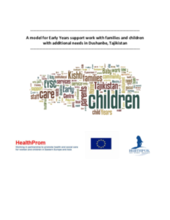This report is Result 4 of a two-year EU funded project “An Early Years Support Centre (EYSC) service in Dushanbe: Reducing poverty, empowering vulnerable families, strengthening partnerships and advocating for rights”. It will outline the model of support that was developed through the EYSC project in Dushanbe, the capital of Tajikistan.
The authors envisage that this document will be used as a guide/template to recapitulate best practice and assist the development of EYSC services in Tajikistan and elsewhere in Central Asia. In addition, it will help to consolidate the learning of the project participants and reinforce the good working partnerships that have been established between the different actors, both state and non-state.
Executive Summary
This Action has sought to contribute to the Millennium Development Goals and the Tajik government’s Poverty Reduction Strategy to decrease the number of children in poverty in Dushanbe. There has been a growing demand in Tajikistan for a cross-sector approach in Early Childhood Development (ECD), where critical gaps exist in both the knowledge and the provision of adequate community services for vulnerable young children. The Tajik government recognises the need to improve both community and family-based social care. It has also begun to acknowledge the key and complementary role non-state actors can play in the provision of such support and services.
The Action’s specific objective was to establish a comprehensive Early Years Service Centre (EYSC) to provide modern fit for purpose community alternative to institutional care for families experiencing difficulties in Dushanbe. International research consistently shows that institutional care has a negative impact on children’s development and ability to reach their full potential. With an emphasis on inclusion, enterprise and innovation the EYSC project focused on 4 key areas:
- Increasing the capacity of professionals to provide ECD and crisis support
- Improving the standards of care in Baby Homes 1 and 2
- Outreach to families in the community
- Strengthening partnerships between state and non state actors
The results show that the Action has been successful in meeting these objectives. It has tackled some of the root causes of child abandonment and placement in residential care, educated professionals in ECD and provided direct learning experiences for families in a community setting. It has improved the physical, social and emotional well being of young children in Dushanbe enabling some to access mainstream education. Partnerships between all the different actors have been strengthened through the implementation period.
A structured training plan meant that the Action was able to create an innovative learning hub, where all the target groups benefitted from ongoing development opportunities and capacity building in ECD issues. The project brought experts from the UK and Russia to focus on particular learning needs and study tours to the UK and Kyrgyzstan, allowed the beneficiaries to learn and share experiences internationally. As a result standards of care in Baby Home 1 and to some extent Baby Home 2 have been improved.
Synergies between the EYSC project and the EU Technical assistance project enabled a new multidisciplinary team to develop and provided the local team with new qualifications in physiotherapy, occupational therapy and social work.
The Action has promoted inclusion, enterprise and innovation with new teams, services and partnerships developing over the 2 years.
Whilst originally meant to have the characteristics of a daycare centre, the EYSC project has helped the Kishti Centre ultimately develop into an Early Years Resource Centre. Providing assessment and support to families for a time-limited period means that the service is more cost effective and efficient. It can now reach more children and promote an inclusion agenda, preparing children for mainstream kindergarten where possible. An additional and positive unanticipated outcome has been the creation of a separate centre for children on the autistic spectrum and the creation of a new NGO IRODA who will focus solely on providing support to families with children on the autistic spectrum.
Parents have benefitted from Mellow Parenting groups, education seminars and income generation activities.
The results of a survey conducted by the Eurasia Foundation in July 2011 showed that the EYSC project has had an impact on parents who have children with disabilities it has; decreased parent’s isolation, increased their knowledge and understanding and empowered them to help their own children.
Throughout the course of the EYSC project, the team has focused on building partnerships and connections with both state and non-state actors, with the objective of raising awareness of the need for effective ECD and joined up services. This lead to the launch of an Early Years Network at the final round table conference in December 2011.
Another key success has been the commissioning of Early Years Services by the Tajik Ministry of Labour and Social Protection for 2012 paving the way to ensure sustainability of the project in the longer term.
The team has identified 10 key components as being essential to the success of the EYSC model
1. Individual assessments and care planning for each child.
2. Access to appropriate and timely therapy.
3. Parent education and support.
4. Home visiting
5. Family Crisis Intervention
6. Creating a learning hub where everyone learns from each other and share what they know.
7. Supporting and advocating for children to be included in mainstream kindergartens.
8. Using and valuing both local and international volunteers.
9. Developing opportunities for families to be involved in income generation activities.
10.Networking with other actors to spread the word about ECD and share resources.
Lessons learnt from the project have been manifold. These have enabled the partners to identify how the EYSC model can be replicated and scaled up.

